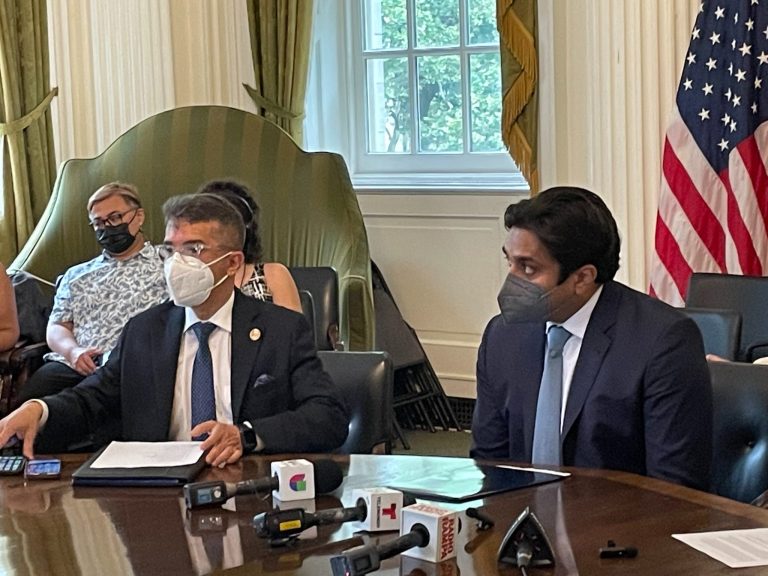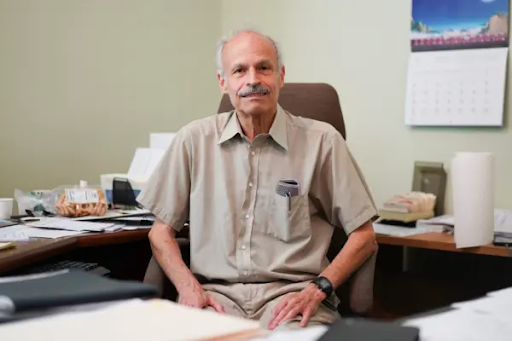Written on behalf of the NYC Department of Health
On Monday, July 25, Department of Health and Mental Hygiene Commissioner Dr. Ashwin Vasan, NYC Test & Trace Corps Executive Director Dr. Ted Long and José Bayona, the Executive Director for the Mayor’s Office of Ethnic & Community Media, held an ethnic and community media roundtable at City Hall to discuss the ongoing COVID-19 response in New York City.
Due to new treatments, recently made available to treat patients who have tested positive for the virus, the City has pivoted their response to focus on treatment.
Dr. Ted Long said that treatment is now a “defining feature of this phase of the pandemic.”
“Treatment begins with testing, and rapid tests are critically important to getting [New Yorkers] the treatment as quickly as possible. Time matters with treatment, it only works if you take it early enough, and treatment could save your life,” he said.
Success
You are now signed up for our newsletter
Success
Check your email to complete sign up
The treatment Long was referring to is the drug, Paxlovid, a Pfizer product that received emergency use authorization from the FDA in December of last year and, according to Long, is “extremely effective” saying that during initial trials the drug was 89 percent effective.
“Then they studied it in the real world, in Israel during Omicron, and the results were even more impressive. We found that your risk of developing severe disease was half that for those that did not take Paxlovid during Omicron,” he said adding that, “So we know these medications are truly life-saving.”
Long says that testing is a priority in addressing the ongoing pandemic. That is why the City of New York has partnered with “more than 930 community based organizations and houses of worship” to assist in testing the population and have distributed 37 million at-home tests.
He said what is most important for New Yorkers to know is that Paxlovid is available, for free to eligible individuals, through various means but primarily by calling, 212-COVID19 or (212)-268-4319.
“So, if you wake up in the morning and you aren’t feeling well, take a home test and in a matter of minutes later you test positive, call the number. We’ll deliver you the medication to your home,” Long said.
In addition, Long said there are 30 mobile units across New York City where one can go, get a rapid test, and if positive, after speaking with a clinician, will leave with the Paxlovid medication, if eligible. Long says New York is the first city in the country to implement a mobile test-and-treat model.
For New Yorkers wondering where to pick up a free home test, all one needs to do is go to maps.nyc.gov/covid-testing.
When asked if Paxlovid is effective against all variants of COVID-19, Long said, “We found that Paxlovid is extremely effective with all the variants we are seeing today … in short, yes these treatments are effective with the new variants.”
COVID-19’s impact on New York City’s health care system
Dr. Ashwin Vasan told reporters that “COVID is still here, it has not gone anywhere, but we are more prepared to address it and it’s not having the impact on human health, and lives lost thankfully, that it has had in previous months and years of the pandemic.”
Vasan said that New York is “finally seeing the amount of severe disease go way down” and that hospitals are no longer saying that they are overwhelmed. “Our ICUs are not full, our health system is not under strain and we are keeping people out of the hospital,” he said.
When asked about the potential for COVID-19 health measures, like mask mandates and vaccine mandates, returning in the fall Vasan said, “I think the kinds of policies we had to put in place, whether it is was restrictions or mandates around masks or requirements around vaccines, were made to protect the most amount of people possible from very bad outcomes at a time of real emergency.”
“We don’t pull those tools out lightly, in fact we don’t mandate a lot of things, we actually do a lot through education, through harm reduction, through counseling, information sharing, that’s the bulk of the work we do in prevention,” he said.
Vasan told reporters that only when New York sees a “real risk to human health,” an “existential threat” or an “urgent situation” would restrictions and mandates be implemented adding that, “So we want to make sure when we pull these tools out that we are doing it at a real level of need and risk and urgency,” asserting that restrictions and mandates would not be implemented “every time we see numbers” rise.















